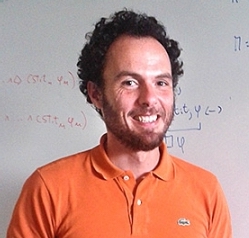Talk by Emiliano Lorini: A Rule-based Modal View of Causal Reasoning
A Rule-based Modal View of Causal Reasoning
| DATE: | Wednesday, February 28, 2024 |
| TIME: | 17:15 – 18:00 |
| VENUE: | Favoritenstrasse 9-11, Helmut Veith Lecture Hall (ground floor) |
ABSTRACT
We introduce a novel rule-based semantics for causal reasoning as well as a number of modal languages interpreted over it. They enable us to represent some fundamental concepts in the theory of causality including causal necessity and possibility, interventionist conditionals and Lewisian conditionals. We provide complexity results for the satisfiability checking and model checking problem for these modal languages. Moreover, we study the relationship between our rule-based semantics and the structural equation modeling (SEM) approach to causal reasoning, as well as between our rule-based semantics for causal conditionals and the standard semantics for belief base change.
SHORT BIO:
Emiliano Lorini is a senior researcher (“directeur de recherche”) at the Centre National de la Recherche Scientifique (CNRS), co-head of the LILaC team (Logic, interaction, language and computation) at the Institut de Recherche en Informatique de Toulouse (IRIT).
The general aim of his research is to develop formal models of interaction between cognitive agents. He has worked mainly worked in the area of AI with strong interaction with other disciplines such as economics, philosophy and cognitive sciences.
Formal methods have been widely used in AI for modeling intelligent systems as well as different aspects of social interaction between artificial and/or human agents (e.g., a team of robots or a virtual agent or a social robot interacting with a human). In his work, Lorini uses logic and game theory as formal tools for building models of interaction between cognitive agents.
Lorini is interested in both the expressivity aspect and the computational aspect of formal models of interaction. First of all, he develops logical languages and semantics that are sufficiently expressive to represent interesting aspects of social interaction. Secondly, he studies their mathematical and computational properties including axiomatizability, completeness, decidability and complexity. Finally, he provides decision procedures for such languages and semantics (e.g., for satisfiability checking and model checking) and leverages them to automate the reasoning and decision-making of artificial agents.

